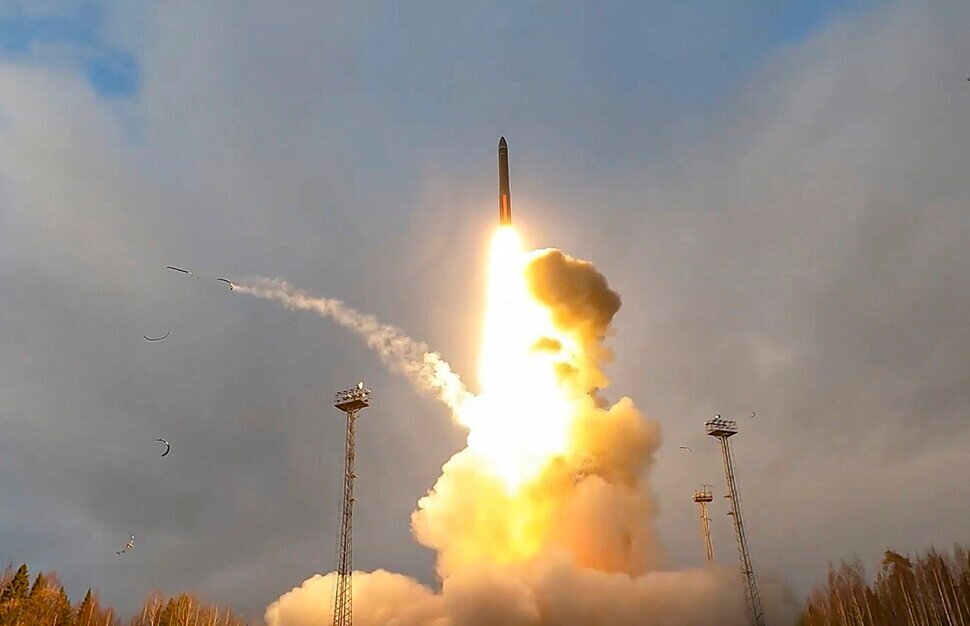North Korea tests its intercontinental banned ballistic missile in a provocative move that has captured international attention. The launch, confirmed by South Korean and Japanese authorities, sent the missile on a record-breaking 86-minute flight before it fell into waters east of the Korean Peninsula. This missile test, executed at a high-angle trajectory, marked a significant escalation in North Korea’s missile program and underscored its continued defiance of United Nations (UN) sanctions prohibiting the development and testing of intercontinental ballistic missiles (ICBMs).
Thursday’s launch saw the missile reaching an altitude of around 7,000 kilometers (4,350 miles), indicating it could have traveled much further on a more level flight path. The unprecedented duration and altitude have raised alarms among neighboring nations and international security organizations, concerned about North Korea’s capacity to strike distant targets, potentially including the continental United States.
Strategic Timing and Escalating Tensions
The timing of North Korea’s test of its intercontinental banned ballistic missile comes during heightened geopolitical tensions in East Asia, with deteriorating relations between North and South Korea. South Korea had previously cautioned that North Korea might attempt such a launch close to the upcoming U.S. presidential election, seeing it as a means to project power and influence global political discussions. South Korea’s defense ministry described this test as a method of “developing weapons that fire farther and higher,” and warned of further provocations.
North Korean leader Kim Jong Un made an unusual public statement following the launch, affirming that the test was a calculated “military response” aimed at “enemies” of North Korea. He declared that North Korea would continue its focus on expanding its nuclear capabilities, a statement that has sparked concern in the international community. The rhetoric and actions have led both South Korea and the United States to consider further sanctions and military deterrents.
International Condemnation and Potential Consequences
The United States swiftly condemned North Korea’s test of the intercontinental banned ballistic missile, describing it as a “flagrant violation” of numerous UN Security Council resolutions. A statement from the White House’s National Security Council accused North Korea of prioritizing its weapons programs “over the well-being of its people” and reiterated calls for the nation to halt its missile development activities. Following the test, South Korea announced plans to implement fresh sanctions against North Korea in response.
Japan, a close neighbor and key U.S. ally, also monitored the missile’s path closely, expressing grave concern about the regional security implications. The country’s defense ministry echoed the sentiment of South Korea and the United States, pledging to strengthen security coordination with both nations.
Advancements in North Korean Missile Technology
Experts believe that North Korea’s recent tests, including Thursday’s launch, aim to improve missile payloads capable of carrying multiple warheads or larger payloads. Kim Dong-yup, an assistant professor at the University of North Korean Studies, noted that the launch may have demonstrated North Korea’s ongoing efforts to develop missiles capable of reaching the U.S. mainland even when carrying heavier warheads. These advancements could present a more severe threat if the missile technology is indeed capable of evading interception.
Previous ICBM tests, such as the December 2023 launch, flew for 73 minutes and reached around 1,000 kilometers before crashing into the sea. With Thursday’s 86-minute test, North Korea’s missile program has now achieved its longest flight time on record, further demonstrating the nation’s expanding missile capabilities and determination to pursue advanced weapons technology despite longstanding sanctions.
The Russia Factor: Alleged Cooperation on the Global Stage
The timing of North Korea’s test of an intercontinental banned ballistic missile also intersects with accusations from South Korea and the United States that North Korea has deployed troops to assist Russia in its ongoing conflict with Ukraine. The Pentagon reported that an estimated 10,000 North Korean soldiers are currently stationed in eastern Russia for training purposes, with additional troops expected to arrive. North Korea’s alleged involvement has intensified concerns over deepening relations between Kim Jong Un and Russian President Vladimir Putin.
While neither Pyongyang nor Moscow has confirmed the troop deployment, the allegations have fueled apprehensions about a potential alliance between North Korea and Russia, particularly in the face of heightened global scrutiny. Experts believe that such cooperation, if confirmed, could lead to more coordinated military and strategic efforts, adding to the complex web of security challenges posed by North Korea.
Regional and Global Implications
The test of North Korea’s intercontinental banned ballistic missile has immediate and far-reaching implications for regional and international security. South Korea and the United States have engaged in strategic discussions aimed at formulating a coordinated response to North Korea’s provocative actions, with both countries’ militaries remaining on high alert. The South Korean military confirmed that it is sharing intelligence with both U.S. and Japanese forces to closely monitor further developments.
This missile test highlights the potential for increased unpredictability in the region, as North Korea’s escalating rhetoric and weapons tests challenge diplomatic efforts and strain relations among East Asian nations. Additionally, with North Korea’s commitment to bolstering its nuclear program, experts anticipate continued testing that could further destabilize the region and increase the risk of miscalculation.
As North Korea tests its intercontinental banned ballistic missile in defiance of international restrictions, the global community faces the challenge of addressing these violations amid broader security concerns.
Stay connected to know more on arcnews.online for global news like North Korea Tests its Intercontinental Banned Ballistic Missile. For videos updates visit our YouTube. Do subscribe to Arcnews to get latest updates directly in your mail box.
Have A Great Day.


